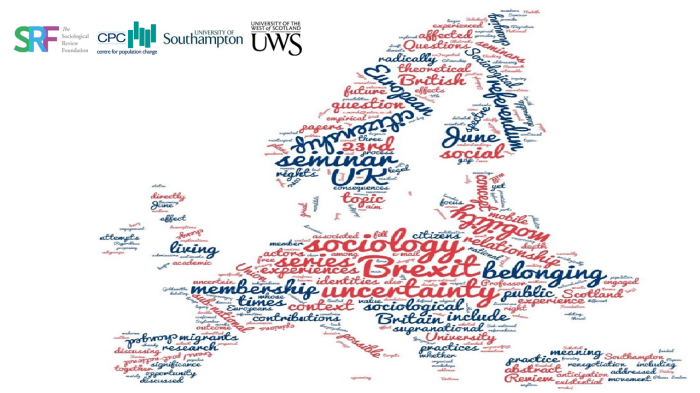The sociology of ‘Brexit’
Citizenship, belonging and mobility in the context of the British referendum on EU membership

A research seminar series funded by The Sociological Review Foundation and supported by the ESRC Centre for Population Change.
This seminar series attempts to ‘think sociologically’ about the already observable and (un)expected consequences of the process by which the United Kingdom exits the European Union. The aim of the seminars is to bring together social scientists, civil society actors and members of the public, whose joint contributions outline the theoretical and empirical possibilities of a ‘sociology of Brexit’.
The narrower context of the seminar series is defined by identifying those sociological subgroups that are most directly exposed to the effects of ‘Brexit’: EU citizens living in Britain and British citizens living in another EU country. The academic presentations and public discussions occasioned by the seminar series focus chiefly on the experiences of such ‘mobile citizens’, and citizenship will be the core sociological concept to be addressed in the context of the anticipation and outcome of the referendum on EU membership. The academic contributions have the double aim of (1) proposing social theoretical explanations of how uncertainty and change affect understandings and practices of citizenship, belonging and mobility, and (2) providing detailed empirical descriptions of how these processes are being experienced by social actors. The public engagement elements of the seminars will provide an opportunity to reconstitute, reinterpret or challenge these sociological narratives and constructs, while also carrying out a clear informative task aligned with the aims of ‘public sociology’.
In answering the broader post-disciplinary aims of the series, the seminars wish to resensitise sociological epistemologies to the ‘fringes’ surrounding ‘every word and every sentence’ uttered by social actors, the ineffable ‘halo of emotional values and irrational implications’ which ‘are the stuff poetry is made of; they are capable of being set to music but they are not translatable’ (Alfred Schütz, The Stranger, 1944). It is, however, only by attempting to ‘translate’ and interpret these ‘fringes’ of discourses and actions that the sociology of ‘Brexit’ can make sense of the various experiences of the unfolding events.
The three seminars organised as part of the series are the following:
- The spectre of Brexit: free movement and European citizenship in question (University of Southampton, 17 June 2016). Keynote speakers: Professor Adrian Favell (University of Leeds) and Dr Michaela Benson (Goldsmiths, University of London)
- Migration and citizenship: evidence from two referendums (University of the West of Scotland, 2 September 2016). Keynote speaker: Professor Jo Shaw (University of Edinburgh)
- The legacy of Brexit: mobility and citizenship in times of uncertainty (University of Southampton, 31 March 2017). Keynote speaker: George Szirtes (Poet and translator)
All three events have been recorded, and links to the recordings are available through individual seminar pages. Updates regarding the events will be made available on this page, as well as on the project’s Facebook page. With questions and proposals for collaboration, please contact the organisers:
Dr Chris Moreh (ESRC Centre for Population Change, University of Southampton)
Dr Emilia Pietka-Nykaza (University of the West of Scotland)
Professor Derek McGhee (University of Southampton)